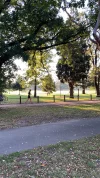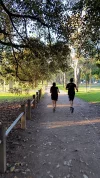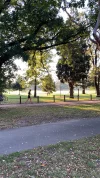- Time of past OR future Camino
- 1340
It’s a truism that not all pilgrims walk for the same reasons. As a consequence not all pilgrims have time to consider their rate of walking. I have often read about how fast some try to travel, but not as often about how slowly or how leisurely. To be sure there are practical reasons for moving fast: time is tight for those who only get at most a few weeks off work for vacation. Very few employers (at least in the US) grant more all at once, so for the employed, getting as much distance in on each trip to Spain becomes a reality. Then there’s the bed race, and those walkers who measure success by the distance they’ve covered in a day.
I find that when I walk alone my pace is generally much faster than walking alongside another. Once, though, I joined with a nice German woman who wanted to practice her English. She was a marathon runner, a self-avowed atheist, and was in terrific shape. She set a torrid pace that I found hard to modulate even after we parted ways.
I’m aware that some people aren’t interested in presence and mindfulness, but for those who are, how you remain mindful of a comfortable pace and not be stressed by external worries, such as, say, finding a place to sleep, or, “Do I have enough time to make it to Santiago if I slow down?”
I remember a three-language conversation at dawn in Murias de Rechivaldo with an Italian pilgrim: I asked if he knew of a place to eat breakfast. He just wanted me to stop talking so he could “get over the mountains,” and practically ran away.
Thomas Merton once said that busyness and hurriedness are forms of aggression:
“The rush and pressure of modern life are a form, perhaps the most common form, of its innate violence.”
Do we bring this rush and pressure to the Camino? How can we be mindful of our steps? How we can sustain this presence over the long, long walk to Santiago?
In the most practical sense it matters to me as I age in terms of the exhaustion and bodily wear and tear I feel after walking too fast with a young and tireless marathon runner.
All the best,
Paul
I find that when I walk alone my pace is generally much faster than walking alongside another. Once, though, I joined with a nice German woman who wanted to practice her English. She was a marathon runner, a self-avowed atheist, and was in terrific shape. She set a torrid pace that I found hard to modulate even after we parted ways.
I’m aware that some people aren’t interested in presence and mindfulness, but for those who are, how you remain mindful of a comfortable pace and not be stressed by external worries, such as, say, finding a place to sleep, or, “Do I have enough time to make it to Santiago if I slow down?”
I remember a three-language conversation at dawn in Murias de Rechivaldo with an Italian pilgrim: I asked if he knew of a place to eat breakfast. He just wanted me to stop talking so he could “get over the mountains,” and practically ran away.
Thomas Merton once said that busyness and hurriedness are forms of aggression:
“The rush and pressure of modern life are a form, perhaps the most common form, of its innate violence.”
Do we bring this rush and pressure to the Camino? How can we be mindful of our steps? How we can sustain this presence over the long, long walk to Santiago?
In the most practical sense it matters to me as I age in terms of the exhaustion and bodily wear and tear I feel after walking too fast with a young and tireless marathon runner.
All the best,
Paul























